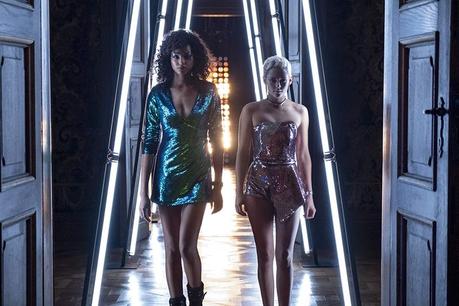Elizabeth Banks’ reboot of Charlie’s Angels is a bold move for the whole franchise. It starts with an exclamation that “women can do anything.” Sometimes, that includes utilizing their charm to get things done—something that Farah Fawcett and co. often did in the TV versions back in the 1970s. Some other time, they’ll have to get into full-throttle actions—like Cameron Diaz, Drew Barrymore, and Lucy Liu’s angels in McG’s 2000 and 2003 tenures excel in. Yet, as the opening conversation continues, Banks’ version adds its credo—highlighting that women also “have their own choices.”
‘Choice’ is a positive driving force in this third iteration of Charlie’s Angels. Bosley still directs the angels’ missions; but, in Banks’ world, Bosley is not a mere character, it’s a title instead. Several persons bear this name including Banks herself (who also produces, writes, and directs), Djimon Honsou, and the excellently cast Patrick Stewart. Under Stewart’s helm, Townsend Agency (respectfully acknowledging earlier versions of the franchise into canon) expands into a global female-frontier spy organization. The new world-building is effortlessly crafted; even when it tends to be simplistic. And yet, this world promises a way more positive direction for future Angels movies.

The new Angels does not immediately start with a trio. Kristen Stewart’s Sabina and Ella Balinska’s Jane encounter each other unwillingly on a past mission before they get reunited for the movie’s main mission. The third character, Naomie Scott’s Elena, isn’t quite an Angel; she’s a tech-savvy on a whistle-blowing mission to “sabotage” the sale of her company’s flawed game-changing device, Calisto a.k.a. the MacGuffin. Unsurprisingly, the mission that entangles the trio altogether is a pretty basic espionage trope—full of treachery and cutting-edge gadgets.
Banks’ vision is revolutionary—giving the Angels’ choices and determination of their own. While managed by Bosley, the Angels act on their own merits, capability, and sometimes culpability. The Angels are not compromised for their nature as women and not subverted for gender limitation. They choose to act and they are determined to accomplish whatever their responsibilities. The finest part is the women are given strong sisterhood bond to support each other. This vision alone is strong enough to distract us from the pulpy story and slipped one-liners.
The emphasis on the sisterhood bond somehow relieves the Angels’ prima donna duty—a trait that other Charlie’s Angels incarnations had been renowned for. K-Stew’s leading girl persona has been relegated to supporting flank, while the combination of breakthrough Balinska and fresh-from-Aladdin Scott could not emanate such leverage, Without the star-power, Charlie’s Angels needs to resort to creatively-staged spectacles—which Banks only occasionally supplies. While the high-concept premise promises certain kinds of spectacles, the end-product isn’t as fruitful and that’s quite disappointing. The movie’s best spectacles come twice only. The first one is during the first car chase where Jonathan Tucker’s placid assassin character continuing to wreak havoc; the other one is the whole cameo-laden scene during the credit (the cameos are top-notch, from some celebrity-athletes to some nostalgic stars).
After all these times, the new Charlie’s Angels finally shows the franchise a new, positive direction, even when the lacks of star-power and gritty actions distract it from the full potentials. However, a sequel might do this set-up a long-awaited justice.

[imdb style=”transparent”]tt5033998[/imdb]
